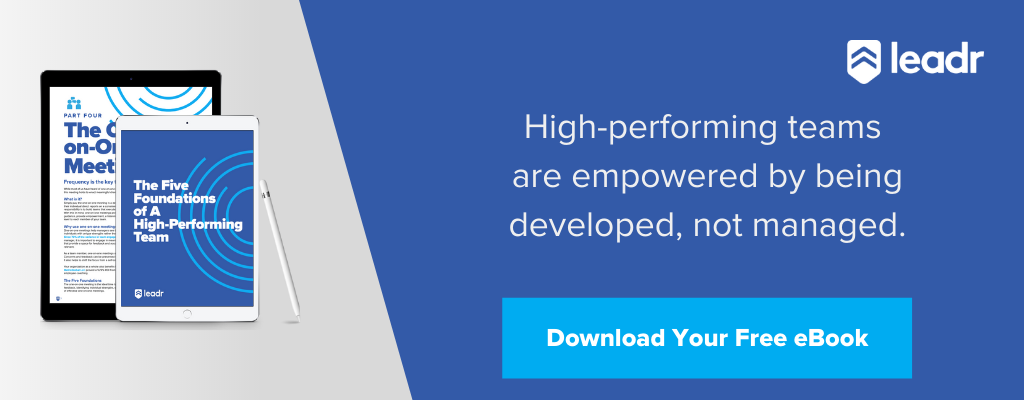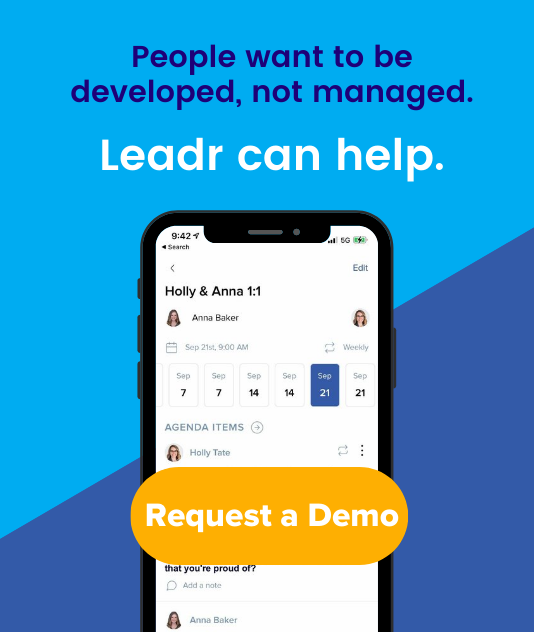4 HR Trends You Can't Ignore In 2023
For the past few years, our society has undergone a rapid change in priorities and structure. As the world emerges from the disruption caused by a global pandemic, organizations and employees are re-evaluating what is important to them. While ping pong tables and coffee stations used to be the perks that attracted and retained employees, the focus has shifted from tangible things to relationships and personal identity. What once seemed to be crucial to the efficiency of an organization or team, has become less important.
Keeping up with the changes and developing solutions to address the evolving needs can be confusing and involve a lot of trial and error. But navigating these changes is key to keeping your team working effectively. We’ve been keeping our pulse on what the workforce is keeping front-of-mind to identify the most important HR trends to embrace in 2023.
1. Intentionality in 1:1 meetings
After a year or more of working remotely, many employees are seeking connection to others and to be recognized as an individual. Intentional one-on-one meetings are the solution to these desires. In 1:1 meetings, leaders meet with their direct reports to discuss individual coaching and empowerment and provide a listening ear. As team members experience first-hand that their leader cares about and nurtures their development, loyalty and engagement follow.
Getting a meeting on the calendar consistently, while not always easy, is a crucial first step towards effective 1:1 meetings. Removing distractions, creating an agenda, and tailoring each one-on-one meeting to the individual employee, will ensure that these conversations provide value to both the manager and the team member.
If you’d like to know more about how to have an effective 1:1 conversation, download our ebook, The One-To-One Meeting: A How-To Guide.
2. Accommodating Hybrid Teams
According to Harvard Business Review, 70% of organizations of all sizes plan to move to some form of hybrid working. With more teams blending remote and on-site work, models of leadership and communication need to change to serve these teams.
With hybrid teams, communicating organizational values and celebrating wins become more important than ever. Workplace culture is determined by the relationships that are developed. In the past, these relationships were built with people that you passed by, and interacted with, every day. With remote and hybrid teams, it is easy to become isolated and lose the relationships that are foundational to your organization’s culture. Small events, like weekly team meetings or in-house social hours, help to maintain and establish connections, refocus the entire team on the mission and goals, and create opportunities to celebrate the team culture.
Learn more about how to build a strong hybrid culture here.
3. Rethinking Reviews
The traditional performance review was a result of technological developments pioneered during the Industrial Revolution. Since then, the workplace has continued to grow and change, but the tradition of the yearly performance review has stayed the same.
In the past, success was measured in efficiency and productivity, but today, the ability to develop the people in your organization is the standard of achievement. The annual performance review should be a continuation of a year-long conversation about goal-setting, direction, and guidance. It becomes an opportunity to reflect on past performance with an eye for future improvement. Employees engaged in this type of review are more likely to leave feeling confident and excited about their potential during the next year.
To learn more about how to start an ongoing conversation about performance with current and future employees, download our ebook, A Manager’s Guide Through The New Hire Onboarding Process.
4. Providing Benefits
As the workforce emerges into a post-pandemic world, many employees are evaluating their jobs based on the benefits that are provided to them. A survey found that 56% of U.S. adults with employer-sponsored health benefits said that whether or not they like their health coverage is a key factor in deciding to stay at their current job.
If health plans are not viable, think about how you can support the health of your team by offering generous PTO packages, gym reimbursements, or mental health days.
Keeping a pulse on what your team values will ensure you’re building a culture that attracts and retains top talent. When your people are your most valuable asset, it’s critical to ensure you provide care and development in the ways they appreciate. At Leadr, it’s our mission to help organizations prioritize the growth and engagement of their people. Learn how our people development software can help your team reach those goals.
What trends and changes have you noticed on your team? Tell us how they impact your organization in the comments.
Share this
You May Also Like
These Related Stories

3 Ways To Prioritize People Development In Performance Reviews

4 Essential Workplace Communication Tools (and how to use them effectively)







No Comments Yet
Let us know what you think